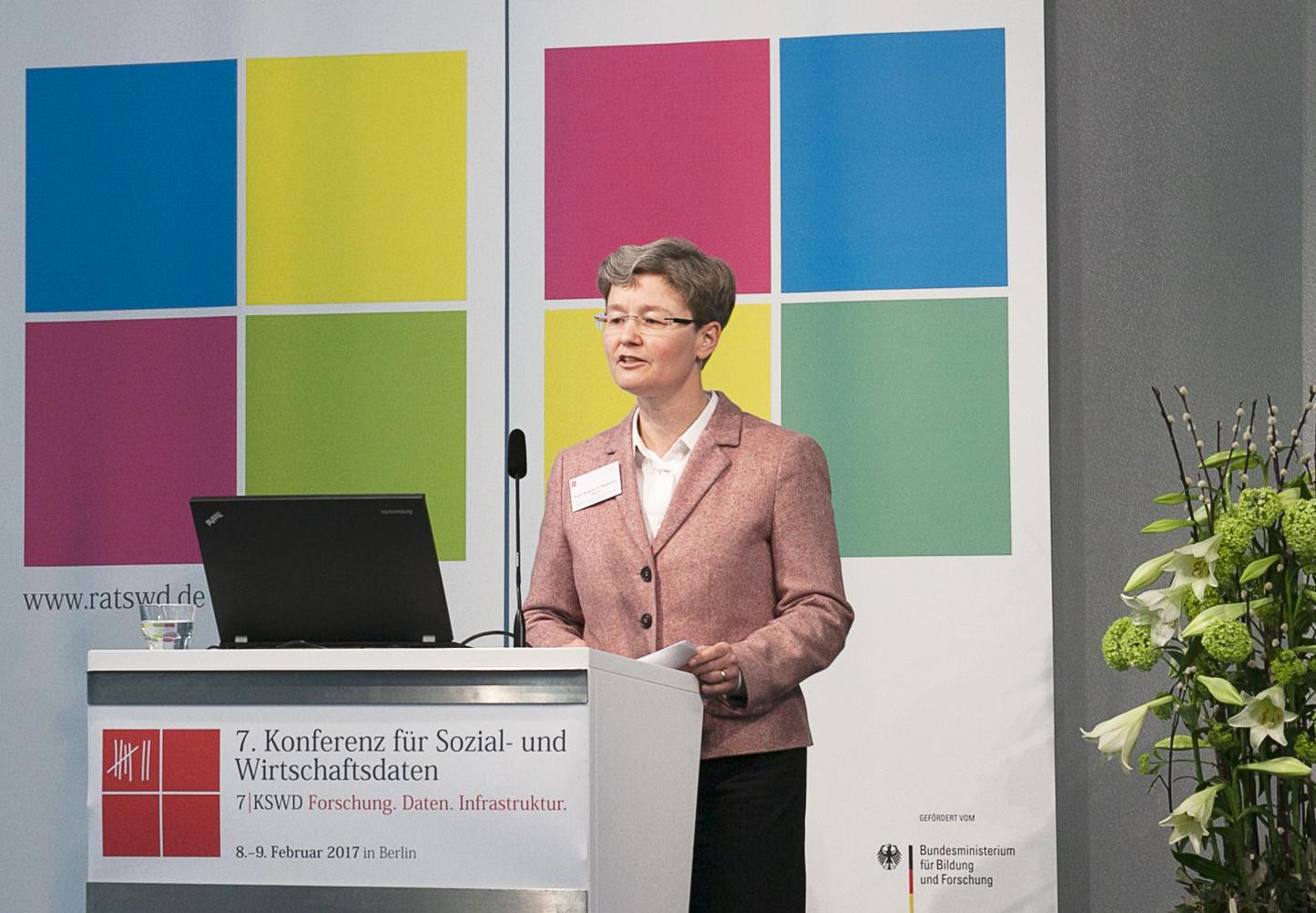7| KSWD “Research. Data. Infrastructure.”: Statistics as a Contribution to Democracy
The 7th Conference for Social and Economic Data (7. Konferenz für Sozial- und Wirtschaftsdaten, 7|KSWD) took place on 8th and 9th February 2017 in Berlin. Research and policy got together to discuss the needs and requirements of future research data infrastructures. A clear outcome was the increasing relevance of statistical competency in the digital age. More than ever, society depends on evidence-based research as a foundation for decision-making.
The German Data Forum (Rat für Sozial- und Wirtschaftsdaten, RatSWD) has greatly contributed to the establishment of a national research data infrastructure in the social, behavioural, and economic sciences. It is therefore ideally suited to be part of a coherent and well-connected scientific community.

For the 7th edition of the Conference for Social and Economic Data, more than 330 representatives from 150 research and policy institutions got together in Berlin to discuss future demands to research data infrastructures in the social, behavioural, and economic sciences. The conference titled “Research. Data. Infrastructure.” took up issues of current relevance: the digital transformation and empirical migration and integration research. Distinguished experts presented and discussed their current research results in presentations across nine forums, including on the population census, panel surveys, the potential of company and education data, issues of data management, research organization, and ethics examination procedures. The extensive conference program reflected the broad range of the German Data Forum’s subjects and activities.
In her opening keynote, Cornelia Quennet-Thielen, state secretary at the Federal Ministry for Education and Research, emphasized the close relationship between the national research data infrastructure and the successful digital transformation of science and research. The federal government and the Länder must continue to develop a comprehensive and well-connected infrastructure in a close dialogue with science and research. Professor Regina T. Riphahn, Ph.D, chair of the German Data Forum, sees the committee taking on a pioneering role in fulfilling this task. In its capacity as an advisory committee and by successfully accrediting 30 research data centers over the past years, the German Data Forum has made a substantial contribution to establishing an efficient infrastructure and a highly qualified national competence cluster. The high turnout at this round of elections highlighted the integration into the scientific community and its considerable interest in the German Data Forum’s activities: the scientific representatives of the German Data Forum’s 6th appointment period were legitimized by a total of 3001 voters from the social, behavioural, and economic sciences, as well as other disciplines.
Professor Dietmar Harhoff, Ph.D., director of the Max-Planck-Institute for Innovation and Competition and chair of the Commission of Experts for Research and Innovation, showed that the digital transformation is affecting very different industries, businesses, and organizations. Innovation, on the one hand, contributes to prosperity and improved living conditions, but, on the other hand, strongly depends on being used in a competent manner. Dr. Klaus Tochtermann (Director of the ZBW – Leibniz-Information Centre for Economics; Kiel University) emphasized that it is essential to better reward data sharing and secondary use of data and to significantly improve training and career opportunities for data experts. Professor Dr. Gerd Gigerenzer, a director at the Max Planck Institute for Human Development, and Walter Radermacher, former general director of Eurostat and former president of the German Federal Statistical Office, underscored the increasing value of data and information in the digital age. Both speakers reaffirmed the significance of “data literacy”, i.e. competency in dealing with data, and the need for specially trained staff. They also reflected the need for collecting, making available and critically evaluating information.
Complex phenomena such as migration and integration require comprehensive empirical analysis, particularly in order to build the foundation for political decision-making. A pivotal issue here is how these important migration data, which were often not collected for research purposes, can be made available to researchers in accordance with data protection regulation. These challenges were discussed by Undersecretary Norbert Seitz (Head of the Department “Migration, Refugees; Return Policy” in the Federal Ministry of the Interior) and Dr. Uta Dauke (Vice-President of the Federal Office for Migration and Refugees), who presented existing access paths to migration data for research purposes. Their aim is to strengthen cooperation with partners in science and research and make research data access permanent via a research data center.
The conference’s Gustav von Schmoller Lecture honored the life’s work of Johann Hahlen (former State Secretary and former President of the Federal Statistical Office) and Eckart Hohmann (former President of the Hessian State Statistical Office). Both have shaped official statistical agencies in innovative ways and with great dedication, including during the founding period of the German Data Forum, and were highly committed to opening up official statistical agencies to science and research. Moreover, Mr. Hohmann has been the legal advisor of the German Data Forum for many years, particularly on matters relating to the EU data protection reform. The eulogy in honour of the services of Mr. Hahlen and Mr. Hohmann was held by Professor Dr. Karl-Ulrich Mayer (former Director of the Max Planck Institute for Human Development and former President of the Leibniz-Association).
The conference also showcased the wealth of data provided by the infrastructure accredited by the German Data Forum. The research data centers presented their data during several humorous Pecha Kucha sessions. A poster presentation session gave young researchers a chance to present their innovative research approaches based on the data provided by the research data centers.
As the starting point for the German Data Forum’s 6th appointment period, the 7|KSWD produced valuable input for its future activities. Many of the conference presentation slides are now available online.
The opening keynote by Cornelia Quennet-Thielen (Federal Ministry for Education and Research) can be read here: https://www.bmbf.de/de/digitalisierung-zeitenwende-fuer-die-forschung-38…
The results of the election of the appointee nominees for the 6th appointment period are available here: https://www.ratswd.de/wahl